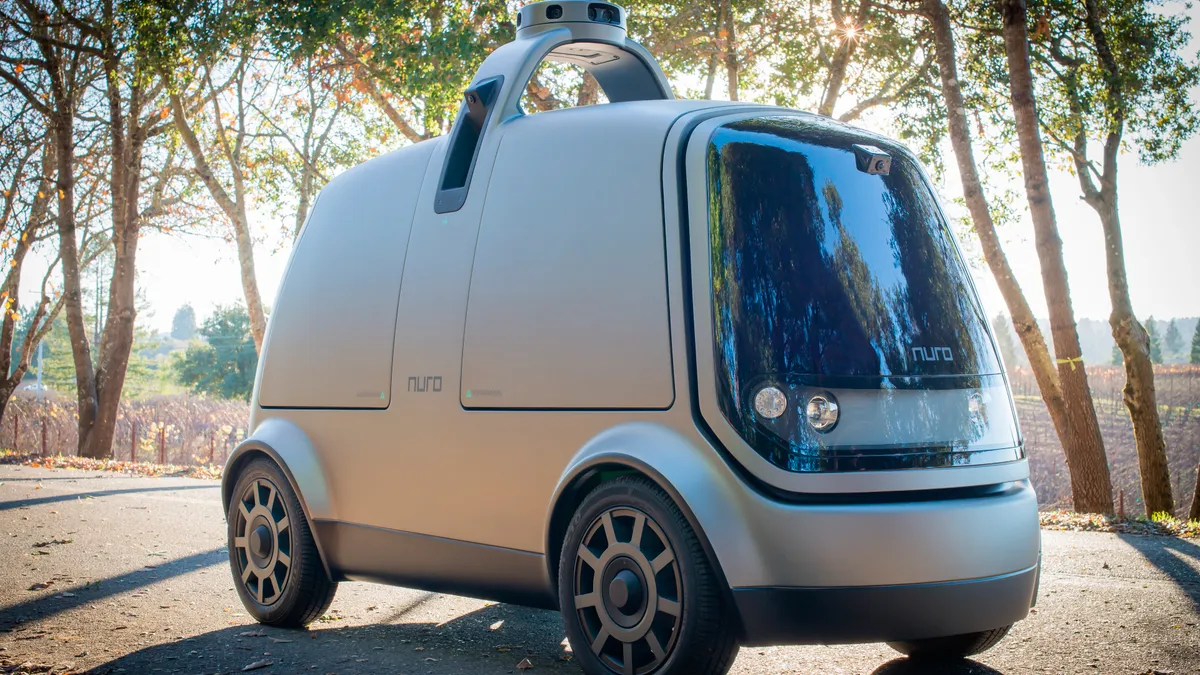Dive Brief:
- Kroger announced it’s the first retailer to put unmanned, fully autonomous vehicles on the road to make deliveries to customers. The retailer and its technology partner, Nuro, have made more than a thousand grocery deliveries since June from a single Fry’s Food Store in Scottsdale, Arizona using self-driving Prius vehicles with an operator onboard. The test will continue to run out of the Fry’s location.
- Nuro’s R1 vehicle, which will handle the deliveries going forward, has no driver or passenger, travels on public roads and can only transport goods. Nuro began developing the R1 in 2016.
- "Kroger customers are looking for new, convenient ways to feed their families and purchase the products they need quickly through services like pickup and delivery," Yael Cosset, Kroger's chief digital officer, said in a release. "Our autonomous delivery pilot with Nuro over the past few months continues to prove the benefit of the flexible and reliable technology.
Dive Insight:
Although it’s often referred to as a large lunchbox or a toaster on wheels, Nuro’s R1 is one of the leading vehicles in driverless delivery, and a notable entrant in the race to get goods to customers more efficiently.
What makes the R1 unique is its delivery-focused design. It’s optimized for carrying goods — an important feature for grocers such as Kroger that have eggs and other fresh goods going out — with capacity for up to 20 grocery bags. It’s also built for customer interaction, with wing doors that open after a customer has entered a special app from their phone.
Nuro founder Dave Ferguson also has noted the R1’s delivery-focused build makes it easier to scale. This could prove beneficial to Kroger as it tests the technology alongside Walmart, which is running driverless tests with Waymo and Ford Motor Company, and startups like Udelv that recently linked-up with e-grocer Farmstead.
Automation technology promises to make online order fulfillment more efficient, lowering fees that are currently prohibitive for many grocery shoppers. Combined with its Ocado partnership and the continued expansion of store pickup and delivery, Kroger is positioning itself to compete with Walmart, Amazon and Target for e-commerce grocery dollars. But questions involving scalability and the overall impact of innovations like driverless delivery still linger.
A recent San Francisco Chronicle report found that while customers like having their orders brought to their home, they missed having goods delivered right to their door. Nuro has smartly taken a customer-focused approach that should allay some of those frustrations. Shoppers can track their delivery using an online map and call a live customer service representative if they need help. In a recently released safety report, Nuro noted the service will “feel familiar to anyone who has ordered a pizza or a package online.”
But people who live in multi-story apartment complexes, customers with children and the elderly and disabled may be reluctant to use it.
It’s also unclear where and how driverless delivery will expand. Nuro’s R1 only travels 25 miles per hour on streets the company has mapped out, and doesn’t travel in inclement weather, according to reports. That makes it ideal for a flat, dry suburban market like Scottsdale, but broader viability seems limited at this point.
The regulatory environment for autonomous vehicles is also unclear, with states and cities piecing together rules and training requirements. Civic leaders in places like Washington, D.C., which is currently developing standards, remain cautious following the death of a cyclist by an autonomous Uber vehicle in Arizona earlier this year.
As driverless technology evolves, companies such as Nuro and Waymo will address many of these concerns. Meanwhile, firms like Starship Technologies are developing delivery bots made to travel along sidewalks. So while it’s unlikely at this point that autonomous vehicles will make all deliveries in the future, it seems they will at least be able to deliver in some of the densest, most profitable markets for retailers.













